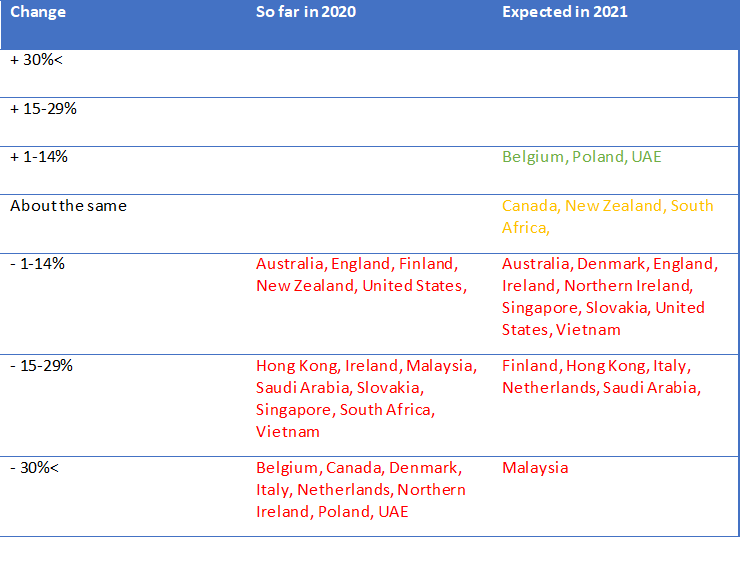ISE’s Tristram Hooley explains how Covid-19 has affected the graduate labour market across the world and introduces a new report from ISE and INEUCS.
Since the start of the Covid-19 outbreak we’ve been chronicling its impact on the UK. We’ve talked about how the UK student labour market is down but not out, speculated on when lockdown will end, given the government plenty of advice on what it should do and then reflected on the Plan for Jobs.
But, isn’t all of this a bit parochial? Even with Brexit rapidly approaching firms are still operating in a global world and many graduates are still thinking about working overseas. So, what is happening in the rest of the world?
Covid is everywhere
The World Health Organisation’s (WHO) Covid-19 dashboard makes for some pretty scary viewing. As I write this there are over 14 million identified cases and 600,000 deaths. Tomorrow there will be more. The map now shows cases and deaths in pretty much every country in the world. While some countries have handled the health issues better than others, it is clear that no one has escaped altogether.
But the Covid-crisis is not only impacting on health. The International Labour Organisation (ILO) has been tracking the impact on employment. Its bulletins show that employment has been disrupted in every country and that young people and entry-level workers are baring the brunt of the downturn in jobs.
In our new report Covid-19: Global impacts on graduate recruitment we worked closely with the International Network of Employers and University Careers Services (INEUCS). We spoke to experts from 21 countries and in every one of them Covid-19 had had a negative impact on graduate recruitment.
Graduate recruitment is down and recovery will be slow
We asked country experts to provide insights on the impact that Covid-19 had had on graduate recruitment so far. Graduate recruitment volumes are down everywhere. During 2020 many employers have taken the decision to delay or reduce the number of graduates that they are recruiting. This has led to overall numbers of jobs in the formal graduate labour market going into decline in all 21 countries that participated in this research.
Even in countries like Australia and New Zealand which have, so far, successfully managed the outbreak and in other countries where there have been relatively few cases of Covid-19, employers have had to lockdown some of their activities in the short term and have concerns about the longer term impacts.
Anticipated growth or shrinkage of the graduate labour market 2020-2021
Most respondents were not anticipating a quick recovery in the graduate market. Looking forward to next year 15 countries expected that the volume of graduates recruited would continue to decline. Only three countries expected that the market would stabilise (Canada, South Africa and New Zealand) and only three more anticipated growth (Belgium, Poland and the UAE).
Changes in the approach to graduate recruitment
In the UK we’ve seen big changes in the way graduate recruitment is done as well as the overall volume. Employers have responded to the lockdown and to social distancing by moving to online attraction, virtual assessment centres and virtual inductions. Looking around the world, the pattern is much the same.
Working practices and business processes are changing and moving online in almost every country. Within the graduate recruitment field this means that attraction and selection are either moving wholly online or into a blended format combining online and face-to-face approaches. While there were some differences between countries in exactly how far they have shifted recruitment activities online, overall the shift to online and remote working practice is clear.
Why should we care about global practice in graduate recruitment?
The fact that many of the patterns and approaches that we have identified in UK graduate recruitment can be seen around the world should be no surprise. Covid-19 has become a global phenomenon, and graduate recruitment is also a global issue. Multinationals and companies based all over the world have spent decades developing and refining their approach to graduate recruitment and when this has been disrupted they have all sought to make use of new technologies to manage their response.
The fact that many firms and many countries have managed things in a similar way is confirming. But it also raises questions about the future. This period of high speed, crisis-driven, innovation has not just happened in one country, it has shifted the global norms. There is good reason to think that the new approaches and practices developed may outlive the pandemic.
Read more in Covid-19: Global impacts on graduate recruitment


0 Comments